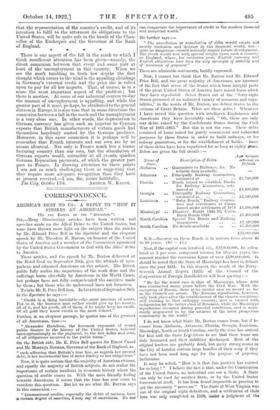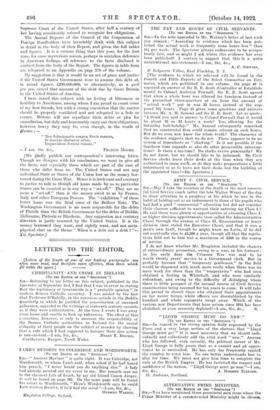CORRESPONDENCE.
AMERICA'S DEBT TO US : A REPLY TO " HOW IT STRIKES AN AMERICAN." (To THE EDITOR or THE " SPECTATOR."] STH,—Many illuminating articles have been written and speeches made on the Allied Debts to the United States, but none have thrown more light on the subject than the articles by Mr. Edward Price Bell in the Spectator and the eloquent
speech by Mr. Theodore E. Burton, ex-Senator of the United States of America and a member of the Commission Appointed by the United States Government to deal with the Allies' debts to America.
These articles, and the speech by-Mr. Burton delivered at
the Hotel Cecil on September 26th, give the attitude of sym- pathetic and educated Americans on this subject. The British public fully realize the importance of the work done and the sufferings borne cheerfully by Americans in the World Cause,
but perhaps have not fully comprehended the sacrifices made by them ; but those who do understand have not forgotten. To take Mr. E. Price Bell first. In his article of September 30th in the Spectator he says :— " Credit is a thing inviolable—the most precious of assets. Put to it, the business man rather would give up his money, all of it, and his goods, all of them, if he might keep his credit. Of all gold they know credit is the most refined."
Further, in an eloquent passage, he quotes one of the greatest of all Americans, thus :— " Alexander Hamilton, the foremost exponent of sound public 'finance in the 'history of the United States, believed uncompromisingly in the payment, to the last dollar and cent, of all obligations incurred in the public name."
On the British side, Mr. E. Price Bell quotes Sir Ernest Cassel and Mr.-Montagu Norman, Governor of the Bank of England, as "each affirming that 'Britain's true line, as regards her present debt, is her immemorial line of strict fidelity to her obligations."
Now, it is quite certain that the majority of American citizens, and equally the majority of British subjects, do not realize the importance of certain incidents in economic history where the question of credits comes in. With the most friendly feeling towards Americans, it seems that the time has now come to ventilate this question. But let us see what Mr. .Burton says
in this connexion :—
• "International credits, especially the debts of nations, have .a certain degree of sanction, I may say of sacredness. No one can exaggerate the importance of credit in the modern financial and industrial world."
He further says :-
" The cancellation or repudiation of debts would create nob merely confusion and distrust in the financial world, but— quite as dangerous—would seriously impair future development. The result would rest with special weight upon such a country as England, where, for centuries past; English currency and English obligations have been the very synonym of stability and of assurance of payment."
These are admirable sentiments, lucidly expressed.
Now, I cannot but think that Mr. Burton and Mr. Edward Price Bell, and the great majority of Americans, are ignorant of the fact that seven of the States which form integral parts of the great United States of America havo raised loans which they have repudiated. Seven States out of the " forty-eight States possessed of an unlimited variety of resources and capa- bilities," in the words of Mr. Burton, are debtor States to the citizens of Great Britain. What are these debts ? Whenever I have raised this question with intelligent Englishmen and Americans they have invariably said, Oh, these are only war debts raised by the Confederate States during the Civil War of 1861-1865." But this is not the case. These debts consisted of loans raised for purely commercial and industrial purposes by these States in order to build railways, or for railway guarantees, or for the establishment of banks. Some of these debts have been repudiated for as long as eighty Pears. Below are given the full details :— App rximata Name of Description of Debts. dishount in
State. Default. Alabama .. Guarantees to Railways, &c. No reliable data available.
Arkansas .. Principally Railway Guarantees,
estimated at .. • £1,740,000
Florida . • Bonds issued to establish Banks for Railway Guarantees, esti-
mated at • £1,400,000
Georgia .. Principally Railway Guarantees,
estimated at .. ▪ £2,540,000 Louisiana • • " Baby Bonds," Railway Guaran-
tees and certificates of Claim issued under settlement of 1874 £1,200,000 Planters' Bonds 1831.33, Union Bank Bonds 1838 £1,400,000 Special Tax Bonds and Railway Guarantees .. £2,520,000 No details available £1,200,000 £12,000,000 N.B.—Interest on these Bonds is in arrears from about 40 to 80 years. ($5 = £1.)
Now, if the capital sum involved, viz., £12,030,000, be calcu- lated at 5 per cent. compound interest for fifty-six years, the amount reaches the enormous figure of over £180,000,000. It
should be noted that the State of Mississippi has been in default since the year 1841. In this respect the words of the Forty- Seventh Annual Report (1921) of the Council of the Corporation of Foreign Bondholders will bear qapting :-
" By far the worst case is that of Mississippi, whose debt was contracted many years before the Civil War. With the exception of Russia, there is no similar case on record so far as the Council are aware. The Russian repudiation, however, only took place after the establishment of the chaotic conditions still existing in that unhappy country, and is viewed with indignation by the better class of Russians, while the Mississippi repudiation occurred during peaceful conditions, and is appa- rently acquiesced in by the citizens of the most prosperous community in the world."
I do not know what State Mr. Burton comes from, but if ho comes from Alabama, Arkansas, Florida, Georgia, Louisiana, Mississippi, North or South Carolina, surely the time has arrived for him and the State Legi.lature to see that these loans are
duly honoured and their liabilities discharged. Most of • the original lenders are probably dead, but many strong-rooms in the City of London contain large bundles of their scrip if they have not been used long ago for the purpose of papering bathrooms. • It may be asked, " How is it that this position has existed for so long ? " I believe the fact is that, under the Constitution of the United States, no individual can sue a State. A State can only be sued by another State, or by the United States Government itself. It has been found impossible in practice to
get the necessary " move on." The State of West Virginia was one of the original eight defaulters, and a settlement of their loan was only completed in 1920, under a judgment of the
Mississippi .. North Carolina South Carolina
Supreme Court of the United States, after half a century of her having consistently refused to recognize her obligations.
The Annual Reports of the Council of the Corporation of Foreign Bondholders have invariably dealt with this subject in detail in the body of their Report, and given the full tables and figures. It is a curious thing that this year, for the first time, for some mysterious reason, perhaps in mistaken deference to American feelings, all reference to the facts disclosed is omitted from the body of the Report•. The figures in table form arc relegated to an Appendix on page 370 of the volume.
My suggestion is that it would be an act of grace and justice if the United States Government were to assume this debt of, in round figures, £200,000,000, or alternatively, as a quid pro quo, cancel that amount of the debt due by Great Britain to the United States of America.
I have raised this subject with no feeling of bitterness or hostility to Americans, among whom I am proud to count some of my best friends, but with a strong conviction that the matter should be properly ventilated and not relegated to a hole or corner. Britons will not repudiate their debts or plea for cancellation, but duly and honourably carry out their obligations, however heavy they may be, even though, in the words of Morace
"Nec fulminantis magna Jowls manus,
Si fractus illabatur orbis, Itnpavidum ferient ruinae."
[We gladly publish our correspondent's interesting letter. Though Ave disagree with his conclusions, we want to give all the facts, and especially those which are part of the case of those who differ from us. The United States and not any individual State or States of the Union lent us the money bor- rowed during the Great War. Hence it is irrelevant and contrary to justice to talk as though old loans made by us to particular States can be counted as in any way a " set-off." They are no more a " set-off " than is the money owed to us by France, Italy and other European Powers. The " exhibition " of these latter loans was the fatal error of the Balfour Note. The Washington Government is no more responsible for the debts of Florida than the British Government for the debts of Dublin, Melbourne, Pretoria or Rhodesia. Any suggestion in a contrary direction is justly resented by the United States. It is the money borrowed they want, and rightly want, and not meta- physical chat on the theme " When is a debt not a debt ?
Spectator.]



































 Previous page
Previous page